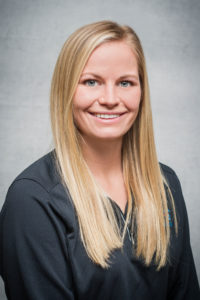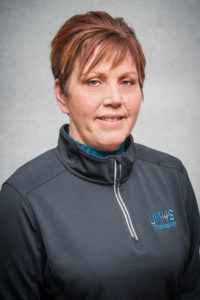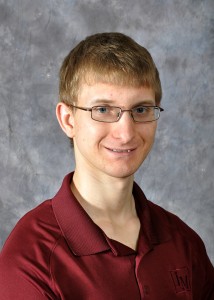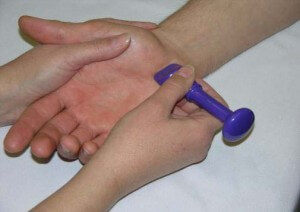At Johnson Memorial Health Services our goal is to help you return to the quality of life you used to enjoy before your injury or illness – as quickly as possible and in the most caring, compassionate environment imaginable. The staff provides inpatient and outpatient rehab services.
Rehabilitation Team
 Bonnie Will, PT, DPT, ATR
Bonnie Will, PT, DPT, ATR
Physical Therapist & Rehab Manager
 Rachel Hakanson, PT, DPT, OCS
Rachel Hakanson, PT, DPT, OCS
Physical Therapist
 Justine Flattum, OTR/L
Justine Flattum, OTR/L
Occupational Therapist
 Jill Mathies, PTA
Jill Mathies, PTA
Physical Therapy Assistant
What is Cardiac Rehabilitation?
- An individualized and personalized treatment plan, including evaluation and instruction on physical activity, nutrition, stress management, and other health-related areas.
- An important part of the treatment of your specific heart problem. If you have one of the following diagnoses you may be eligible to participate:
- Heart Attack
- Angina
- Coronary artery angioplasty or stents
- Open heart surgery such as coronary bypass or valve surgery
- Heart failure
- Heart transplantation
- Generally covered by most health insurance companies but check your plan to determine co-pays or other requirements. Contact your local Cardiac Rehabilitation facility to inquire what programs are available for patients who do not have insurance
Recent scientific studies have shown that people who complete a cardiac rehabilitation program can increase their life expectancy by up to five years.
Benefits of Cardiac Rehabilitation:
- Live longer and lessen your chances for another heart attack
- Control heart disease symptoms such as chest pain or shortness of breath
- Stop or reverse damage to your blood vessels in your heart
- Lessen the physical and emotional effects of heart disease
- Improve your stamina and strength, getting you back to your usual activities, including work, hobbies, and regular exercise
- Improve your confidence and well-being
Phases in Cardiac Rehab:
Phase II: Early Outpatient
Phase II of the Cardiac Rehab Program offers a continuation of the education and exercise that should have been initiated in Phase I (when the patient was hospitalized). Phase II usually begins one to two weeks after the patient leaves the hospital. The length of the Phase II program is determined on an individual basis. The usual and recommended attendance for the Phase II program is two to three times weekly for up to 36 visits.
Most insurance cover some, if not all, of the Phase II costs. Patients should contact their insurance companies to determine coverage.
Phase II Cardiac Rehabilitation Offers:
- Assessment of your personal risk factors for heart and blood vessel disease
- Education and support to make healthy lifestyle changes such as
- Maintaining a healthy weight
- Heart healthy eating
- Avoiding tobacco and environmental smoke
- Beginning and maintaining a personalized exercise plan that works for you
- Monitoring and better control of:
- Blood pressure
- Lipids /cholesterol
- Diabetes
- Psychological/stress assessment and counseling
- Opportunity to meet and share stories with other patients like you
- Improved communication with your doctor and other healthcare providers about your progress following your cardiac event
Phase III: Supervised Outpatient
Phase 3 cardiac rehab focuses on exercise that is unmonitored (performed without a heart monitor). It is for patients who have completed the Phase II program and still desire supervision of medical staff during exercise and for those that have a qualifying medical condition that may lead to heart disease such as obesity.
The goal of Phase III is to promote long-term lifestyle changes and adhere to an appropriate exercise regimen. Patients are independent in this phase. They monitor their own heart rate and workloads and are supervised by the cardiac rehab coordinator, who is also there to answer and questions and/or concerns.
The staff monitors weekly blood pressures, heart rates while exercising and provides a bi-annual progress report that updates medications, lab work, and workloads. A physician referral is needed to enter the program; however, it is not necessary if a patient recently graduated from the Phase II monitored program.
Phase III is not covered by insurance companies.
Experience a form of healing and relaxation that has been around for centuries.

Certified Massage Therapist
Experience the art of massage. Please contact the clinic receptionists to schedule an appointment. Flexible appointment times are available. Massage Services available include:
- Professional Massage and Bodywork
- Chair Massage
Hours:
Tuesday & Thursday 2:00-5:00pm
Wednesday 2:00-7:00pm
Services offered Monday-Friday
- Cognitive assessment to assist in determining ability to live independently, ability to drive, etc and what services should be put in place to increase safety and independence
- Pediatric evaluations and treatments including but not limited to: Autism Spectrum disorders, developmental disability, CP, Sensory Processing Disorder, handwriting difficulty, etc.
- Sound Assisted Soft Tissue Manipulation (SASTM)
- Physical Agent Modalities (ie therapeutic ultrasound, e-stim, etc)
- Home and job site evaluations to determine equipment/environmental modifications to increase independence and safety
- Elbow, wrist, and hand diagnoses and injuries (i.e. Carpal Tunnel, amputation, arthritis, etc)
- Adaptive equipment/devices recommendations and usage to increase ADL independence
- Sensory programming for people with mental health/developmental disabilities
Do you have questions or concerns about your child’s development?
JMHS provides pediatric services for Physical, Occupational and Speech therapies. We strive to make treatment fun through an environment rich with opportunities for movement, sensations, and learning. Our licensed therapists deliver one-to-one therapy, so children and families can meet their unique challenges and enrich their lives.
Pediatric Occupational Therapy
Our occupational therapist works with families to assist their children in learning functional skills; such as the development of hand-eye coordination, visual perception, oral skills for eating, coordination of the whole body, and feeling comfortable with the positioning and movement of their body during daily activities. These skills are reinforced by progressive work on their ability to pay attention, remain calm, and learn self-care techniques, such as personal grooming, personal hygiene, and dressing themselves. Our therapist also specializes in sensory processing difficulties and teaches both the child and family how to best cope with this intricacy in his/her daily life. Our goal is to work with the whole family to develop successful, cooperative behavior patterns and effective problem-solving skills.
Your child may need Occupational Therapy if he/she is experiencing any of the following below:
- Poor fine motor skills
- Trouble with reading/writing
- Immature gross motor skills
- Decreased motor control
- Decreased eye-hand coordination
- Difficulty with visual perception
- Overly sensitive to sensory input
- Under responsive to sensory input
- Touches people or objects constantly (seeking sensory input)
- Crashes and/or bangs into people or objects
- Falls often
- Difficulty calming self
- Difficulty with sleeping
- Difficulty with eating and food choices
- Difficulty with sitting still, attention, and/or behavior
- Emotional reactivity
- Reactive to feel of clothing, baths, haircuts, nail cutting, or tooth brushing
- Limited play skills
- Poor social development
- Limited independence in self-care skills
- Difficulty transitioning or accepting change in environment or routine
Pediatric Physical Therapy
Our physical therapists work with families to address challenges and delays in the areas of gross motor development, motor planning, and developing typical movement patterns. This may include addressing broader areas, such as normal development and quality of movement, and more specific areas, such as muscle tone, strength, range of motion, coordination, balance, and sensory integration. We treat children from birth through adolescence with limitations related to injury, disease, or congenital conditions.
Physical therapy might be needed anytime a problem with movement limits someone’s daily activities. Some of the conditions that may limit movement include:
- Sports injuries
- Developmental delays
- Cerebral palsy
- Genetic disorders
- Orthopedic disabilities/injuries (joint pain/strain)
- Heart and lung conditions
- Birth defects(such as spina bifida)
- Effects of in-utero drug or alcohol exposure
- Acute trauma
- Head injury
- Limb deficiencies
- Muscle diseases
Our physical therapists are committed to helping children reach their full developmental potential and build the confidence they need to be independent and improve their quality of life. Contact our office to schedule an evaluation.
Pediatric Speech Therapy
With younger children, delays in communication can be hard to identify or judge. All children develop at different rates and, for some, moving from babbling to full, well-pronounced and grammatically correct sentences can be a slow and challenging process that takes time. Typically, the speech of 3-year-old children is understood by most people (both familiar and unfamiliar to the child). Also, most 3-year-old children can understand and respond to what other people say to them.
Our speech-language pathologists are committed to helping children reach their full developmental potential and realize their full range of communication abilities for improved quality of life, increased active participation in their families and increased independence in activities of daily living.
Your child may benefit from Speech Therapy if he/she experiences any of the following:
- You or other people have difficulty understanding your child.
- Your infant/toddler is not babbling/playing with sounds or trying to imitate you.
- People think your child is younger than they actually are because of the way s/he speaks.
- Your child is being teased or shows frustration because of the way s/he talks.
- Your child uses fewer words than other children of his/her age.
- Your child stutters or produces speech with many stops and starts.
- Your child’s interactions or play seem unusual or inappropriate when compared with peers.
- Your child struggles with reading, writing, and/or spelling.
- There is a diagnosis that could affect speech or language such as hearing loss, auditory processing disorder, autism spectrum disorder, or developmental delay
Physical Therapy is for clients injured through accidents or diseases to provide therapy and education to lead to a quicker recovery and return to previous levels of function and activity. Physical therapy is helpful for the following conditions:
- Joint and muscle pain (sprains/strains)
- Back or neck or other joint pain
- Pinched nerves
- Balance problems or dizziness
- Those with difficulty walking or performing daily functional tasks
- Sport-related injuries
- Age-related injuries
- Injuries/dysfunctions from accidents, falls, strokes or birth defects
- Muscle/joint weakness
- Pelvic pain or urinary incontinence
- Repetitive stress or strain injuries
- Chronic Pain
Treatments include a thorough evaluation, education regarding cause and effect and prevention, exercises, manual (hands on) treatments, SASTM therapy, pool therapy or modalities (traction, ultrasound, electrical stimulation, ice/heat packs, iontophoresis). Most treatments are geared toward home programs and prevention of symptom recurrence.
More specialized services for Agrability, vestibular rehabilitation, and urinary incontinence are now being offered at JMHS. Vestibular rehab, therapy for people with dizziness and balance problems, is a more specialized service being offered in P.T. We also offer noninvasive exercises and education based programs for urinary incontinence, bowel/bladder programs, and pelvic pain. Agrability, where P.T. works with a state and federal organization to help injured rural residents working with agriculture, is also an offered service.
If you have pain, balance issues or other physical dysfunction – please talk with your doctor about starting Physical Therapy at JMHS. Physical therapy services are offered Monday-Friday 8:00am to 5:00pm or as otherwise scheduled. Athletic screens (free to local athletes) can also be scheduled.
Pulmonary Rehabilitation allows you to make the most of the limited lung function you have.
Pulmonary rehabilitation is a service that is designed for those who experience lung problems such as:
- Chronic Obstructive Pulmonary Disease (COPD)
- Emphysema
- Chronic Bronchitis
- Bronchiectasis
- Sarcoidosis
- Pulmonary Hypertension
- Pulmonary Fibrosis
- Interstitial lung disease
- Lung cancer and lung cancer surgery
- Lung volume reduction surgery before and after lung transplantation
What is Pulmonary Rehab?
Pulmonary Rehab is an exercise and education program that teaches a person with chronic lung disease, how to exercise and do regular daily activities with less shortness of breath. Pulmonary Rehab is Designed to:
- Help you lead a more active life.
- Encourage your active involvement in your treatment.
- Help keep you out of the hospital.
Pulmonary Rehabilitation Benefits
Pulmonary Rehabilitation helps you to improve your quality of life. Although Pulmonary Rehabilitation (PR) can’t cure your lung disease, it can be of great benefit and you may notice improved breathing effort and less breathing problems. Other benefits include:
- Decrease the symptoms of your disease or condition
- Ability to function better in your daily life
- Increased ability to exercise
- Decreased symptoms and better management of anxiety and depression
Monitored and Supervised Exercise
A physical activity plan is tailored to your needs. Exercise will help improve your endurance and muscle strength, so you’re better able to carry out daily activities.
Educational Programs
The education classes focus on COPD as well as other chronic lung diseases to provide you with information about:
- Medications, including drug action, side effects, using an inhaler, and self-care techniques
- Understanding and using oxygen therapy
- Diet, nutrition, and weight management
- Breathing retraining
- Importance of exercise
- Strategies for managing breathing problems
- Symptom assessment and knowledge about when to seek medical treatment
Psychosocial Support
People who have chronic lung diseases are more prone to depression, anxiety, and other emotional problems. We can help you find the right level of support needed.
Is Pulmonary Rehab Covered By My Insurance?
Insurance coverage varies. The Pulmonary Rehab Coordinator will assist you with determining this.
How Do I Get Enrolled In A Pulmonary Rehab Program?
Talk to your primary healthcare provider about your interest in the program.
How Does SASTM work?
The SASTM method is a form of instrument-assisted soft tissue mobilization. This method enables clinicians to effectively locate and treat areas of soft tissue dysfunction through the use of an instrument, thus preventing overuse of their hands.
Instruments effectively break down fascial restrictions and scar tissue. The ergonomic design of these instruments provides the clinician with the ability to locate restrictions through sound waves. This allows the clinician to locate and treat the affected area with the appropriate amount of pressure.
The introduction of controlled micro-trauma to affected soft tissue structure causes the stimulation of a local inflammatory response. The micro-trauma ‘initiates healing’…
…in the re-absorption of inappropriate fibrosis or excessive scar tissue and facilitates a cascade of healing activities, resulting in remodeling of affected soft tissue structures. Adhesions within the soft tissue, which may have developed as a result of surgery, immobilization, repeated strain or other mechanisms, are broken down allowing full functional restoration to occur.
 We use instruments designed to detect and treat scar tissue.
We use instruments designed to detect and treat scar tissue.
Common Treatable Diagnosis
- Back Pain
- Golfer’s Elbow
- Shin Splints
- Knee Pain
- Ankle Sprains
- Neck Pain
- Plantar Fasciitis
- Tennis Elbow
- Shoulder Pain
- Carpal Tunnel
- Hip Pain
- Hamstring Injury
- IT Band
- Trigger Finger
The SASTM Program incorporates bio-mechanic testing, flexibility/strength training & SASTM treatments along with education to enhance and improve your biomechanics in order to sustain life long fitness results.
SASTM provides the following benefits:
- Restores function and reduces pain where other treatments have failed.
- Reduces the need for surgical intervention.
- Contributes to the overall reduction of health-related costs.
- Allows individuals to stay on the job, and keeps athletes in action.
- Provides physicians with an alternative to offer their patients.
Scheduling is done through the Physical Therapy Department.
Speech Therapists are involved in the assessment and rehabilitation of communication and swallowing disorders. Speech therapists will evaluate an individual’s ability to swallow and then set up an appropriate type or texture of diet. Speech therapists also work on methods of communication and cognitive testing to help assess individual needs so they can continue to communicate with others and organize their thought processes.
Disorders commonly seen by Speech Language Pathologists include:
- Strokes
- Parkinson’s Disease
- Developmental Delays (Children)
- Autism
- Multiple Sclerosis
- Hearing Impairments
- Cancer (Head, Neck and Throat)
